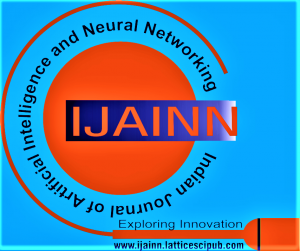![]()
Integrated Diagnosis, Treatment and Prognosis in Healthcare using Artificial Intelligence
Devaharish Srikannan
Devaharish Srikannan, B.Tech, Department of Computer Science and Medical Engineering, Sri Ramachandra Faculty of Engineering and Technology, Sri Ramachandra Institute of Higher Education and Research (DU), Chennai (Tamil Nadu), India.
Manuscript received on 01 February 2024 | Revised Manuscript received on 09 February 2024 | Manuscript Accepted on 15 April 2024 | Manuscript published on 30 May 2024 | PP: 1-5 | Volume-4 Issue-3, April 2024 | Retrieval Number: 100.1/ijainn.C108604030424 | DOI: 10.54105/ijainn.C1086.04030424
Open Access | Editorial and Publishing Policies | Cite | Zenodo | OJS | Indexing and Abstracting
© The Authors. Published by Lattice Science Publication (LSP). This is an open access article under the CC-BY-NC-ND license (http://creativecommons.org/licenses/by-nc-nd/4.0/)
Abstract: Artificial Intelligence (AI) has revolutionized healthcare by integrating treatment, diagnosis, and prognosis into a cohesive and patient-centric approach. This study examines how utilising AI technology in healthcare might improve patient management and have a transformational impact. Huge volumes of patient data, including as genetic data, medical records, and treatment outcomes are analysed by AI algorithms, allowing for the creation of individualised treatment regimens based on precise prognostic assessments and diagnoses. Utilising AI-driven decision-making promotes proactive and preventative actions, improving healthcare outcomes. To ensure ethical AI adoption, however, concerns about data privacy, algorithmic bias, and ethical issues must be addressed. In order to demonstrate how AI-driven therapy approaches are successful, case examples are reviewed in this article, demonstrating how they might potentially enhance patient care. As AI develops, its seamless integration with healthcare systems has enormous promise for revolutionising medical practise. It will usher in a new era of accurate, effective, and data-driven patient management, which will ultimately be advantageous to both patients and healthcare professionals. its capacity to enhance patient care.
Keywords: Treatment, Diagnosis, Prognosis, Patient Management, Personalised Treatment, AI Algorithms, Integrated Healthcare, Patient-Centric Approach, AI-driven Decision Making, Ethical Considerations, Data Privacy, Algorithmic Biases, Case Studies, Transformative Potential, Proactive Interventions.
Scope of the Article: Reasoning and Evolution
